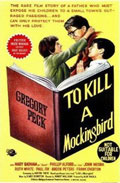
Directed by
Robert Mulligan
123 minutes
Rated M
Reviewed by
Bernard Hemingway

To Kill A Mockingbird
Harper Lee's famous Pulitzer Prize winning novel about a lawyer (Gregory Peck) who defends a wrongly accused Negro in a small Alabama town during the early 1930s is a relatively early instance of civil rights issues making an appearance in a major Hollywood studio movie albeit in quite an old-fashioned way. This is particularly evident in the contrast between Atticus Finch as an upright, paternalistic god-fearin' white man and Tom Robinson (Brock Peters), the man he defends as a blubbering ye'sah black man. Perhaps however in this respect it is more truthful to the reality it depicts than we might now think, screenwriter Horton Foote being credited with staying faithful to Lee's novel which in turn is based upon her own experience of growing up in the Deep South, the Atticus character being modelled upon that of her own father.
Events are seen through the eyes of an young innocent, the story being told in flashback by Lee's alter ego, the adult "Scout" whose voice-over at the beginning of the film takes us back to her childhood. Ten year-old Mary Badham as the young "Scout" is a delight, both she and Phillip Alford as her older brother giving marvellously naturalistic performances whilst Peck's stock upright citizen character is well-suited to the role of the virtuous paragon, Atticus.
The film has trouble balancing the lengthy depiction of the children's world with the relatively hastily dealt-with trial scene which suffers from overly melodramatic oratory by Atticus and a rather too neat compartmentalisation of racism in the lower orders. Nevertheless,Mulligan's directorial style which very much grounded in classic 1950s approach to 'social conscience' film-making (it was preceded by smaller films such as Joseph L. Mankiewicz's No Way Out,1950 and Stanley Kramer's The Defiant Ones, 1958), the black and white cinematography by Russell Harlan and Elmer Bernstein's score all combine smoothly in a quality production.
FYI: Robert Duvall made his feature film debut as Arthur "Boo" Radley.
Want something different?





